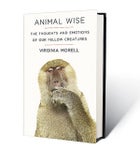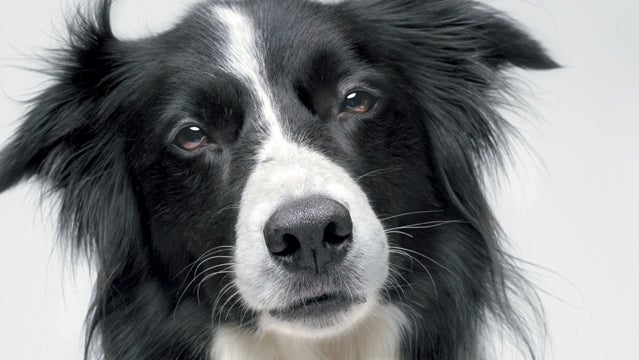Pepperberg and I walked to the back of the room, where Alex sat on top of his cage, preening his pearl gray feathers. He stopped at her approach and opened his beak.
Test Your Knowledge
Quiz: Inside animal minds. Animal Wise.
Animal Wise.“Want grape,” Alex said.
“He hasn’t had his breakfast yet,” Pepperberg explained, “so he’s a little put out.”
Alex closed his eyelids halfway, hunched his shoulders, and looked at her. His narrowed eyelids and hunch made him look crabby.
“Don’t look at me like that,” Pepperberg said to him. “See, I can do it, too.” She narrowed her eyes and gave him a stony look, imitating his expression. Alex responded by bending his head and pulling at the feathers on his breast.
To me, she said, “He’s in a bad mood because he’s molting, and sometimes when he’s like that he won’t work.” She spoke to Alex again, “You’ll get your breakfast in a moment.”
“Want wheat,” Alex said.
Arlene Levin-Rowe, the lab manager, handed Pepperberg a bowl of grapes, green beans, apple and banana slices, shredded wheat, and corn on the cob. Pepperberg held up the sliced fruits and vegetables for Alex, who seized them with his beak. Sometimes he held them with a claw and tore them into smaller bits. If he didn’t want something, like the green beans, he said, “Nuh,” meaning “No.” It was an emphatic “Nuh”—short, and decisive. His voice had a slightly nasal and digitized quality, but it was also tinny and sweet, like the voice of a cartoon character. It made you smile.
Under Pepperberg’s patient tutelage, Alex had learned how to use his vocal tract to imitate about 100 English words, including the sounds for all of the foods she offered him, although he called an apple a “ban-erry.”
“Apples may taste a little bit like bananas to him, and they look a little bit like cherries, so Alex made up that word for them,” Pepperberg said.
Alex could also count to six and was learning the sounds for seven and eight.
“I’m sure he already knows both numbers,” Pepperberg said. “He’ll probably be able to count to 10, but he’s still learning to say the words. It takes far more time to teach him certain sounds than I ever imagined.”
Alex was also learning to say “brown.” As a kind of learning aid for “brown,” Pepperberg placed a small wooden block painted chocolate brown next to Alex.
After breakfast, Alex preened again, keeping an eye on the flock. Every so often, he used his claw to pick up the toy block and held it aloft as if showing it to everyone in the room. Then he opened his beak: “Tell me what co-lor?”
“Brown, Alex. The color is brown,” Pepperberg, Levin, and the other assistant replied in a kind of singsong unison. They stretched out brown into almost full two syllables, emphasizing the “br” and “own.”
Alex listened silently. Sometimes he tried part of the word: “rrr … own.” Other times, he again held up his block and repeated his question: “What co-lor?” And the trio of humans replied together: “Brown, Alex. The color is brown.”
Then Alex switched to the number seven: “Ssse … none.”
“That’s good, Alex,” Pepperberg said. “Seven. The number is seven.”
“Sse … none! Se … none!”
“He’s practicing,” she explained, when I asked what Alex was doing. “That’s how he learns. He’s thinking about how to say that word, how to use his vocal tract to make the correct sound.”
It sounded a bit mad, the idea of a bird willingly engaging in lessons and learning. But after listening to and watching Alex, I found it difficult to argue with Pepperberg’s explanation for his behaviors. She wasn’t handing him treats for the repetitious work or rapping him on the claws to make him say the sounds.
“He has to hear the words over and over before he can correctly imitate them,” Pepperberg said, after she and her assistants had pronounced “seven” for Alex a good dozen times in a row. “I’m not trying to see if Alex can learn a human language,” she added. “That’s not really the point. My plan always was to use his imitative skills to get a better understanding of avian cognition.”
In other words, because Alex was able to produce a close approximation of the sounds of some English words, Pepperberg could ask him questions about a bird’s basic understanding of the world. She couldn’t ask him what he was thinking about, because that was beyond his vocabulary, but she could ask him about his understanding of numbers, shapes, and colors. To demonstrate, Pepperberg carried Alex on her arm to a tall wooden perch in the middle of the room. She then retrieved a green key and a small green cup from a basket on a shelf. She held up the two items to Alex’s eye.
“What’s same?” she asked. She looked at Alex nose-to-beak.
Without hesitation, Alex’s beak opened: “Co-lor.”
“What’s different?” Pepperberg asked.
“Shape,” Alex said. Since he lacked lips and only slightly opened his beak to reply, the words seemed to come from the air around him, as if a ventriloquist were speaking. But the words—and what can only be called the thoughts—were entirely his.
Prior to Pepperberg’s study, scientists believed that birds could not learn to label objects. Assigning labels to items was something that only humans could do, linguists such as Noam Chomsky had argued in the 1960s. Scientists were also certain that birds could not understand concepts such as “same” and “different,” or “bigger” and “smaller.” Yet for the next 20 minutes, Alex ran through his tests, uttering the labels for a range of items (key, cup, paper) and distinguishing colors, shapes, sizes, and materials (wool versus wood versus metal) of various objects. The concept of “same/different” is considered cognitively demanding. It required Alex to pay attention to the attributes of the two objects and to understand exactly what Pepperberg was asking him to compare—their color, shape, or material. He had to make a mental judgment and then vocally give her the answer, using the correct label.
Next, she and Alex moved on to some simple arithmetic, such as counting the yellow toy blocks among a pile of mixed hues. Animals’ ability to count is a much debated subject, but Alex seemed able to do this (and Pepperberg had published several papers attesting to his skill). He even understood the concept of zero, or none, as he called it—again, the only animal, other than two chimpanzees, so far known with this ability.
And, then, as if to offer final proof of the mind inside his bird brain, Alex spoke up. “Talk clearly!” he commanded, when one of the younger birds Pepperberg was teaching mispronounced the word green. “Talk clearly!”
“Don’t be a smart aleck,” Pepperberg said, shaking her head at him. “He knows all this, and he gets bored, so he interrupts the others, or he gives the wrong answer just to be obstinate. At this stage, he’s like a teenage son; he’s moody, and I’m never sure what he’ll do.”
“Wanna go tree,” Alex said in a tiny voice.
Alex had lived his entire life in captivity, but he knew that beyond the lab’s door there was a hallway and a tall window framing a leafy elm tree. He liked to see the tree, so Pepperberg put her hand out for him to climb aboard. She walked him down the hall into the tree’s green light.
“Good boy! Good birdie,” Alex said, bobbing on her hand.
“Yes, you’re a good boy. You’re a good birdie.” And she kissed his feathered head.
Reprinted with permission from by Virginia Morell. Published by The Crown Publishing Group, a division of Random House, Inc.


